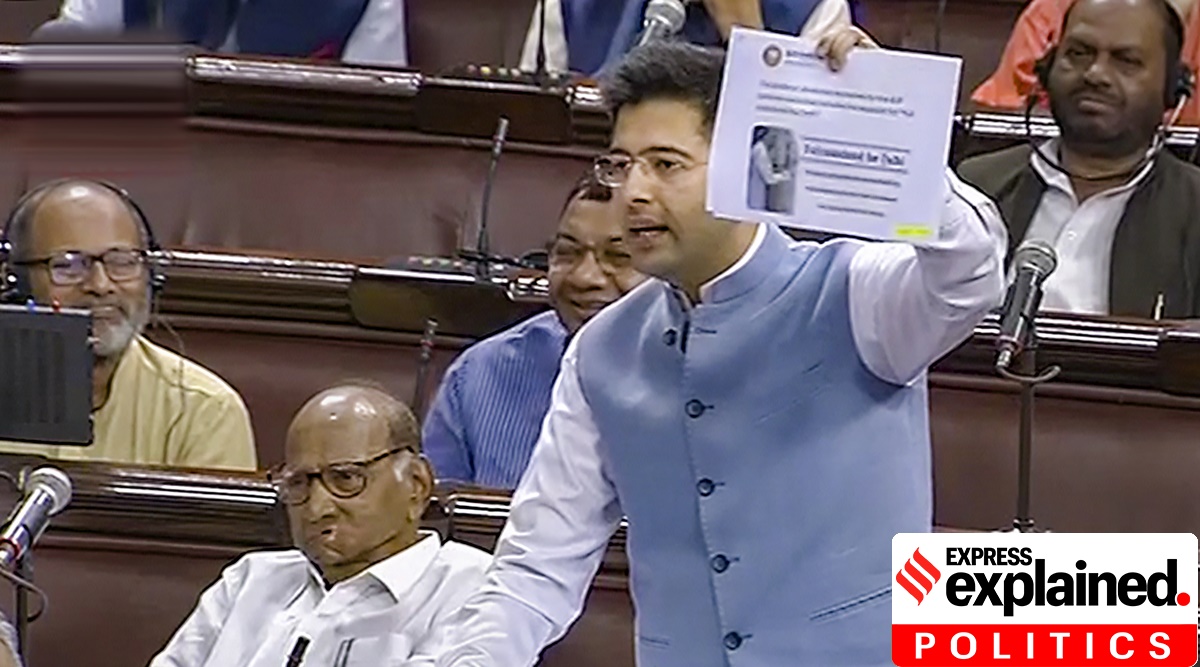After at least four MPs complained that their names had been included in a proposed Select Committee for the Delhi Services Bill without their consent, Rajya Sabha Deputy Chairman Harivansh on Monday announced a probe.
The Select Committee was proposed by Aam Aadmi Party (AAP) MP Raghav Chadha in the Upper House. After the deputy chairman read out the names to be included in the proposed committee, Home Minister Amit Shah said members had complained their names were included without their signatures in the proposal moved by the AAP leader.

Terming it a breach of privilege of the House, he said the matter should be referred to the Privileges Committee. “Who signed on their behalf is a subject of investigation,” he said, and requested the Chair to record the statements of the complainant members.
A day later, AAP leader Sanjay Singh protested the Home minister’s statements, accusing him of spreading rumours. “Don’t you know that no one’s signature is required to propose the name in the Select Committee? Do not spread lies and rumours, Home Minister,” Singh said.
Five MPs of the Rajya Sabha — S Phangnon Konyak, Narhari Amin and Sudhanshu Trivedi of BJP, M Thambidurai of AIADMK and Sasmit Patra of BJD — had said their name was included in the proposal without their consent.
What is a Select Committee, and how is it set up? What do Rajya Sabha rules say about members’ signatures being taken?
What is a Select Committee?
India’s Parliament has several types of committees which discharge different functions. There are 12 Standing Committees that are permanent in nature, with their members nominated from time to time by the Chairman. The Privileges Committee, which Shah wanted the Raghav Chadha matter referred to, is one such.
Then there are ad hoc or temporary committees, which are set up for a specific purpose, such as examining a particular Bill, and are dissolved once that purpose has been served. A Select Committee belongs to this category. However, while it is temporary in nature, the procedure it is to follow is laid down in the Rules of Procedure.
Also in Explained | An Expert Explains: Roles and limitations of Select Committees, parliamentary panels
Under Rule 125 of the Rajya Sabha Rules and Procedures, any member may move an amendment that a Bill be referred to a Select Committee.
According to the Rajya Sabha rules, “The Select/Joint Committees on Bills are constituted by the House(s) on specific motion moved by the Minister in-charge of the Bill or any member and adopted by the House to consider and report on Bills as referred to them from time to time.” A Joint Committee has members from both Lok Sabha and Rajya Sabha.
The motion to refer a Bill to a Select Committee can either be moved by the member in-charge of the Bill, or by any other MP, as happened in the case of the Delhi Services Bill, where the motion was moved by Chadha.
How are a Select Committee’s members selected?
According to the Rajya Sabha rules, “On a motion moved in and adopted by the House, Bills are from time to time referred to Select Committees, the members on which are specifically named in the motion… The members of the Select Committee on a Bill are appointed by the House when the motion that the Bill be referred to a Select Committee is made… No member is appointed to a Select Committee if he is not willing to serve on the Committee. The mover has to ascertain whether the member proposed by him is willing to serve on the Committee.”
Thus, while the rules do say that a proposed member’s consent has to be taken before he can serve on a Select Committee, they do not specifically mention collecting signatures of those whose names have been proposed.
The actual number of membership of the Select Committee is not fixed; it varies from Committee to Committee. If it is a Joint Committee, the proportion of members from the Rajya Sabha and the Lok Sabha is 1:2. The Chairman of the Committee is appointed by the Chairman of the Rajya Sabha from among the members of the Committee.
The member or Minister in-charge of the Bill is generally included as a member of the Committee.
How does a Select Committee work?
The quorum for each sitting needs to be one-third of the total number of members of the committee. In case of equality of votes on any matter, the chairman (or any other person presiding) will have a second or casting vote. A select committee may appoint a sub-committee to examine any special points connected with the Bill. The report will be signed on behalf of the committee by the chairman. Any member can record dissent. The report, along with notes of dissent, will be presented to the Rajya Sabha, printed and circulated among all members.
And what exactly does a Select Committee do?
The Committee’s job is to go through the text of the Bill, clause by clause, in order to see that the Bill “reflects clearly the intention behind the measure and the object proposed to be achieved is adequately brought out,” Rajya Sabha rules say.
Most Read 1When ex-ISRO chief was told to ‘get lost’ by ISRO satellite centre 2Israel-Hamas War News Live Updates: Israel investigating events in southern Lebanon where Reuters journalist killed 3When Amitabh Bachchan shared what changed after Aishwarya Rai joined the Bachchan family: ‘One daughter left…’ 4Amitabh Bachchan calls Jaya Bachchan his worst critic: ‘She walks out of my movie trial and then we have domestic problem at home’ 5‘Rajesh Khanna’s dates were impossible to get’: Sharmila Tagore says she could’ve been ‘sued’ for compromising ‘Sapno Ki Rani’ shoot
“The Committee may, for this purpose, invite memoranda from or take oral evidence of experts or interested persons and organisations. The Committee may also ask the Government officials to explain the policy behind the various provisions of the Bill and to supply to it such information and background material as may be required by it. After hearing the evidence, the Committee considers the various provisions of the Bill and formulates its conclusions and may amend the clauses, etc. of the Bill to bring about the intention clearly.
The Committee may also visit organisations and institutions, etc. for on-the-spot study of a matter connected with the Bill.”
Also ReadBaiga tribal group gets habitat rights in Chhattisgarh: What this means, …Why Odisha govt’s new rural development scheme has triggered a controversyMoney Bills vs Finance Bills: What are the differences, what the court ha…What is the alleged AP skill development scam in which Chandrababu Naidu …
What happens once a Select Committee’s report is submitted?
The report of the committee is of a recommendatory nature. The government can choose to accept or reject its recommendations. A Select Committee can also include its version of the Bill. If they do so, the minister in charge of that particular Bill can move for the committee’s version of the Bill to be discussed and passed in the House.



